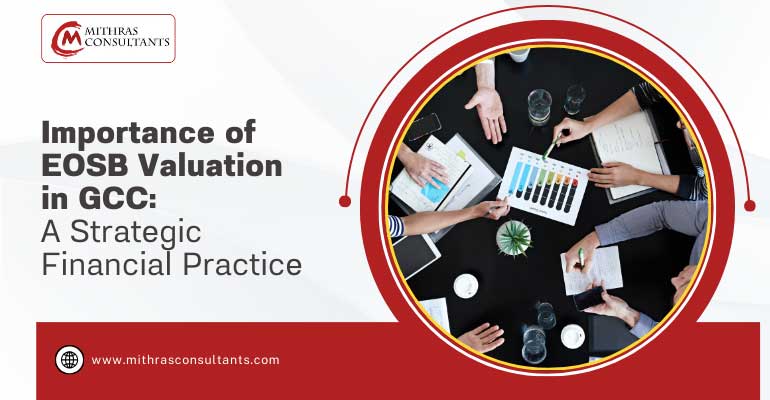Importance of EOSB Valuation in GCC: A Strategic Financial Practice

In the dynamic business environment of the Gulf Cooperation Council (GCC), companies constantly navigate economic shifts, workforce transformations, and regulatory changes. One essential practice that has gained considerable importance is the End of Service Benefit (EOSB) valuation. Often seen as a statutory compliance requirement, EOSB valuation plays a far more critical role in financial planning, employee satisfaction, and long-term sustainability for businesses operating across the GCC.
Let us explore why EOSB valuation is not just a legal obligation but also a strategic financial imperative for businesses in the region.
Understanding EOSB in the GCC Context
Companies in the GCC are legally bound to pay a lump sum gratuity to employees upon termination of employment, except in cases of gross misconduct. This is known as End of Service Benefit (EOSB). The EOSB system is deeply rooted in local labour laws and varies slightly across the GCC countries—namely Saudi Arabia, UAE, Kuwait, Oman, Qatar, and Bahrain.
The benefit is calculated based on the employee’s salary and years of service. While this seems straightforward, the financial liability involved becomes significant as the company grows, both in size and in employee tenure. That is where professional EOSB valuation becomes crucial.
Why EOSB Valuation Matters for Businesses
EOSB is a future obligation. Companies must estimate and account for this liability well in advance. An accurate and professional EOSB valuation provides more than just compliance; it ensures financial readiness and enhances trust among stakeholders.
1. Accurate Financial Reporting
Financial transparency is a cornerstone of business integrity. EOSB liabilities are long-term obligations that must be accurately reflected in a company’s balance sheet. Proper valuation ensures:
- Compliance with International Financial Reporting Standards (IFRS)
- Clearer understanding of actual liabilities
- Transparent audit trails
This level of financial clarity enhances the trust of investors, regulators, and auditors in the company’s operations.
2. Informed Budgeting and Cash Flow Planning
EOSB payouts can significantly impact a company’s cash flow, especially when large groups of employees retire, resign, or are laid off. An accurate valuation enables companies to:
- Set aside adequate reserves
- Avoid cash flow disruptions
- Plan future workforce investments with confidence
Businesses that proactively manage EOSB obligations can better weather economic slowdowns or unexpected workforce reductions.
3. Workforce Management and Strategic HR Planning
A well-maintained EOSB reserve gives HR leaders greater flexibility in handling workforce planning. It helps in:
- Developing attractive employee retention packages
- Managing retirements and end-of-service transitions smoothly
- Boosting employee confidence in the organisation’s long-term commitment
When employees know their benefits are accurately accounted for, their trust and motivation tend to improve.
4. Mergers, Acquisitions and Business Restructuring
In business restructuring scenarios like mergers or acquisitions, the EOSB liability can influence deal terms significantly. An independently conducted EOSB valuation helps in:
- Valuing the true cost of human capital
- Ensuring transparency between merging or acquiring parties
- Avoiding future legal or financial surprises
A credible EOSB report supports smoother negotiations and reduces potential risks.
5. Legal and Regulatory Compliance
Each GCC country has its labour laws and specific regulations regarding EOSB calculation. Professional valuation ensures that the business:
- Adheres to the legal framework of the operating country
- Minimises the risk of non-compliance penalties
- Aligns its internal policies with local employment laws
Failure to comply may lead to reputational damage, legal disputes, and financial penalties.
EOSB Trends and Challenges in GCC
In recent years, the GCC region has experienced notable shifts:
- High employee turnover across certain sectors increases EOSB payouts.
- Workforce nationalisation policies like Saudisation and Emiratisation impact workforce structure and benefits.
- IFRS updates and audits are demanding more accurate EOSB accounting.
- Cost optimisation initiatives are prompting companies to closely analyse every line of liability, including EOSB.
With these trends, accurate EOSB valuation becomes not just necessary but strategic. Companies that treat EOSB as part of their overall risk management framework gain better financial control and long-term stability.
Why Choose a Professional EOSB Valuation Service?
While some businesses may rely on in-house HR or finance teams for rough EOSB estimates, this approach often leads to inaccuracies. Here is why professional valuation is recommended:
- Independent actuarial assessments ensure objectivity and compliance.
- Advanced models consider various variables—salary escalations, attrition rates, inflation, etc.
- Regular updates capture real-time shifts in workforce and compensation.
Outsourcing to a trusted actuarial consultant gives businesses the peace of mind that their obligations are being handled with precision and care.
Conclusion
EOSB valuation is not a back-office formality. It is a critical financial and operational priority for every responsible business in the GCC. Whether you are a startup with a small team or a multinational with thousands of employees, the implications of EOSB are far-reaching. Accurate valuation allows for smoother financial planning, legal compliance, and enhanced workforce trust.
At Mithras Consultants, we understand that each business is unique. As an independent actuarial and insurance consultancy firm, we specialise in delivering high-quality financial and insurance solutions. Our approach is always tailored to the specific needs of our clients. We empower businesses with data-driven insights to help them make the best decisions in managing financial, insurance, and risk programs effectively.
By offering custom strategies and trusted expertise, we help you manage your EOSB obligations with clarity and confidence.

 Call Us
Call Us Whatsapp Us
Whatsapp Us